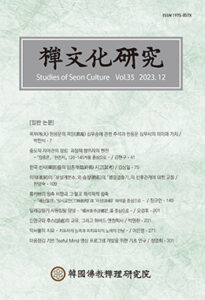
Park Young-hwan 박영환
《禅文化研究》Studies of Seon Culture, Vol. 35, 2023.12, pp.231-270
Abstract: Hu Shi(胡適) is a representative Chinese scholar of the 20th century. Seo Yeo Min Young-gyu is also one of South Korea’s representative historians of Buddhism in the 20th century and one of the scholars who achieved outstanding results as a Yangming scholar and bibliographer. These two people, who first met in December 1954 through Harvard’s Yenching Institute, continued to discuss the Chinese Zen Buddhism lineage through face-to-face meetings and exchanges of letters. Min sympathized with Hu Shi’s argument and provided Hu Shi with a copy of 『Zutangji』, which had not been made public at the time, to aid his research. At the same time, Min helped Hu Shi and made efforts to secure materials related to “Shenhui(神會)” in Korea. Carrying forward Hu Shi’s visit to South Korea was also aimed at advancing the study of Zen Buddhism in South Korea and East Asia. The academic passion of these two men, who strived to rewrite not only the history of East Asian Zen Buddhism but also the history of Korean Zen Buddhism, is fully revealed in their letters. Therefore, not only does Min Young-gyu’s research on the history of Korean Zen Buddhism inherit Hu Shi’s research, in addition, Min’s research methodology, that is, fundamental skepticism about existing theories, meticulous evaluation, and reinterpretation through argument and empirical evidence, is solely inherited from Hu Shi’s research methodology of new literary positivism. For this reason, Min was able to reveal that his representative work 『Sacheon Gangdan』, which criticized existing views on Buddhism in the Korean academic community and explored a reinterpretation of the Zen Buddhism lineage, and 『JungPyeon-Jodongowi』, which was published in 1680 by “Jodongjong” in Japan, are works of Il-yeon. And his other book 『Entry into Jerusalem』, which reinterprets the life of Jesus through various non-Christian documents, is also a representative outcome based on this research methodology. It can be seen that the research of the two men has considerable significance in academic and cultural exchange between the East and the West. The coincident encounter between Min Young-gyu and Hu Shi at Harvard’s Yenching Institute in December 1954 left a significant mark on the study of Korean Buddhist history.
초록: 후스(胡適)는 20세기 중국 대표적인 석학이다. 서여 민영규도 20세기 한국 대표적인 (불교)사학자이면서 양명학자, 서지학자로 뛰어난 성과를 거둔 석학이다. 1954년 12월, 하버드 옌칭학사를 매개체로 처음 만났던 두 사람은 이후 직접 대면과 서신 교환을 통해서 중국 선종 법맥에 대한 논의를 진행해 왔다. 민영규는 후스의 주장에 공감하는 한편, 후스 연구를 돕기 위해 당시 공개가 되지 않은 『조당집』을 후스에게 제공하였을 뿐만 아니라, 후스가 찾고 있던 신회 관련 자료를 한국에서 확보하기 위해 노력하였다. 후스의 한국 방문 추진도 한국과 동아시아 선종 관련 연구를 진일보 발전시킬 목적이었음을 알 수 있다. 동아시아 선종 역사뿐만 아니라 한국선종사를 다시 쓰기 위해 노력하는 두 사람의 학문적인 열정이 고스란히 서신에 나타나고 있다. 따라서 민영규의 한국선종사 연구가 후스 연구를 계승하고 있는 동시에 게다가 민영규의 연구방법론, 즉 논거와 실증을 통해서 기존 학설에 대한 근본적인 회의와 세심한 고증과 재해석이 후스의 신문 헌실증주의 연구 방법을 그대로 계승하고 있다. 그러므로 한국 학계의 기존 불교관을 비판하며 선종법맥에 관한 재해석을 다룬 민영규의 대표 저작 『사천강단』과 1680년 일본 조동종에서 간행한 『중편조동오위』가 일연의 저술임을 민영규가 밝혀낸 것, 그리고 다양한 기독교 이외 문헌을 통해 예수 생애를 재해석하였다는 『예루살렘입성기』도 바로 이러한 연구방법론에 근거한 대표적인 결과물이다. 두 사람의 연구가 동서양의 학술문화교류에 있어서도 적지 않은 의미가 있음을 알 수 있다. 1954년 12월, 두 사람의 우연한 만남은 이렇게 한국불교사 연구에 커다란 족적으로 남는다.
About the author: Park Young-hwan was a Harvard-Yenching Library Research Grant recipient in 2023.
